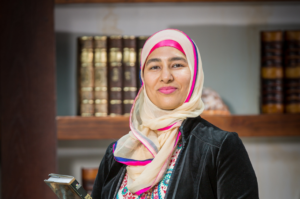
Tope Folarin’s “Miracle” is one of the shortlisted stories for the Caine Prize for African Fiction, the first of five stories that I will be reviewing in the next couple of weeks.
After two months on a healing tour across America, a long awaited miracle worker has finally arrived at a Nigerian church somewhere in north Texas to show the wondrous power of faith to put an end to suffering, doubts, handicap and most of all make dreams come true.
A boy, whose name we never really know and whose age we can only guess finds himself on stage. The prophet promises to cure him of asthma and eye troubles. Things move quickly. We follow the character through every minute of the strange and intense experience up to the point when the miracle happens or is supposed to have happened. That’s the thing with this story. You never really know. Can we call what happens in the end a miracle? Does the story compel us to redefine what the miraculous is?
There is no doubt that the story revolves around a complex sense of what a miracle is. There is the common sense of the miraculous as something grand, theatrical, spectacular, that aspires towards the supernatural, that happens once in a while like when a Man of God travels all the way from Nigeria and makes a stop at your church. But there is another kind of miracle that takes place in our private and domestic lives, that is unobserved by spectators, that is modest and involves our capacity to survive and assert ourselves day by day against a world determined to make us fail. This is the kind of miracle that some people have in mind when they say: “Thank God for the miracle of sleeping through the night and waking up in one piece”—the little miracles that exist within the ordinariness of the everyday. What Folarin does so beautifully is to place the two forms of miracle side by side without making one seem more authentic than the other.
You’d have to read very carefully so as not to miss Folarin’s little trick with pronouns. In the first part of the story, a formless “we” is doing the narrating. This plural figure tells us about itself, and what has brought it to the church. “We need jobs. We need good grades. We need green cards. We need American passports. We need our parents to understand that we are Americans. We need our children to understand they are Nigerians. We need new kidneys, new lungs, new limbs, new hearts. We need to forget the harsh rigidity of our lives, to remember why we believe, to be beloved, and to hope. We need miracles.”
But since miracles, especially in the Christian tradition, is something that happens to an individual subject, the story has to extract from this formless collective that individual who alone can be the object of God’s wondrous power.
This happens when the prophet points to a boy and calls out: “YOU! You! You! YOU! Come up here!” In that very moment there is a shift. The story is no longer narrated by a “we.” The collective is pushed to the background as a passive spectator. A still anonymous but individual character emerges and takes over, and his first utterance is: “I turn around suddenly, and I realize I’m no longer a part of the whole.” This play on pronouns—the movement from a “we” to an “I” through a “you”— that anchors the anonymity of the story’s principal character is quirky but brilliant.
“Miracle” is also a little story made up of a thousand pretty little sentences. One of my favorite is the description of the prophet’s eyes: “His sunglasses fall from his face, and we see the brilliant white orbs quivering frantically in their sockets, two full moons that have forgotten their roles in the drama of the universe.” All through the story, sentences and images are finely crafted without being excessively delicate. Put simply, Folarin writes beautifully without seeming like he is trying too hard.
Click HERE to read the story.









Tope Folarin’s A Particular Kind of Black Man| The Republic April 30, 2020 18:25
[…] Folarin pinged the consciousness of African literary audiences in 2013 when his short story, ‘Miracle’, won him the Caine Prize. ‘Miracle’ spurred debates about its fictional provenance and the […]